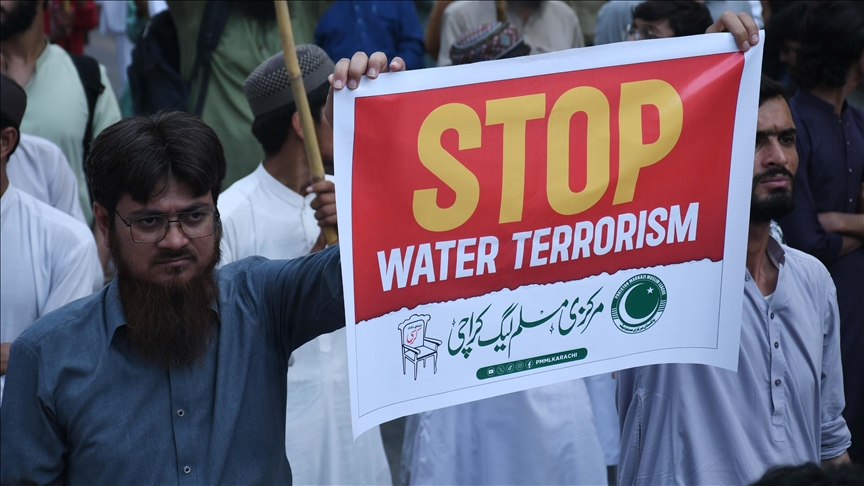India, Pakistan take reciprocal measures as tensions escalate after Kashmir attack
Unidentified gunmen killed 26 people in Indian-administered Kashmir on Tuesday
 Supporters of the Pakistan Murkazi Muslim League party chants slogans during a demonstration against the suspension of water-sharing treaty by India with Pakistan, in Karachi, on April 24, 2025.
Supporters of the Pakistan Murkazi Muslim League party chants slogans during a demonstration against the suspension of water-sharing treaty by India with Pakistan, in Karachi, on April 24, 2025.
- New Delhi announced unilateral suspension of 1960 water-sharing treaty, expulsion of diplomats, closure of land route
- Islamabad mirrored some of New Delhi’s moves and also suspended trade, closed airspace
- Pakistan also put in abeyance 1972 Simla agreement, according to which all disputes, including Kashmir, should be resolved bilaterally
ISTANBUL
India and Pakistan have taken reciprocal measures, including the suspension of bilateral pacts and closing the only legally operating land border, after an attack in Jammu and Kashmir that killed 26 people.
New Delhi on Wednesday suspended its decades-old Indus Waters Treaty, under which two nuclear-armed neighbors regulate water share of six rivers on the Indus Basin.
Islamabad called the move “reckless” and warned any attempt by India to divert or stop water to Pakistan would be considered as an “act of war.”
Unidentified gunmen killed 26 people, including 25 tourists mainly Indians and one local resident, in Indian-administered Kashmir's Pahalgam on Tuesday.
🚨 Protesters gathered in Karachi to denounce India’s decision to halt the decades-old water-sharing treaty with Pakistan
— Anadolu English (@anadoluagency) April 24, 2025
💧 The suspension came a day after an attack on tourists in Indian-administered Kashmir https://t.co/dPJwPNll3F pic.twitter.com/0SHEuilviw
Measures by India
New Delhi announced its unprecedented decision to suspend the Indus Waters Treaty after Indian Prime Minister Narendra Modi chaired a meeting of the Cabinet Committee on Security.
It also expelled Pakistani military advisers stationed at Islamabad’s diplomatic mission in New Delhi, and reduced the number of Pakistani diplomatic staff.
Visas issued to Pakistani citizens under the regional SAARC framework were also suspended.
On Thursday, New Delhi said visa service to Pakistan across all domains will be suspended, asking Indian citizens visiting its western neighbor to return home "at the earliest."
New Delhi also closed the only operating land border at Wagah-Attari with Pakistan.
Simla pact put in abeyance
Pakistan retaliated on Thursday, stressing there was no provision to unilaterally suspend the water-sharing pact, which was mediated by World Bank and signed in September 1960.
However, Islamabad’s most significant step was to suspend Simla Agreement, a bilateral pact signed in 1972 which promotes bilateral dispute resolution and respect for the Line of Control in the disputed Kashmir region.
The decisions were announced after Prime Minister Shehbaz Sharif chaired a meeting of National Security Committee, which was attended, among others, by all service chiefs.
Islamabad mirrored New Delhi’s move against military advisers, by expelling Indian defense attaches and reduced diplomatic staff at the Indian mission in the Pakistani capital.
It also closed border on its side of the Attari-Wagah crossing, and suspended all bilateral trade as well as any third-party business through Pakistan.
Islamabad also suspended visa service to all Indian nationals under the SAARC Visa Exemption Scheme, with the exception of Sikh religious pilgrims, and closed its airspace for all Indian-owned or Indian-operated aircraft.
Anadolu Agency website contains only a portion of the news stories offered to subscribers in the AA News Broadcasting System (HAS), and in summarized form. Please contact us for subscription options.







